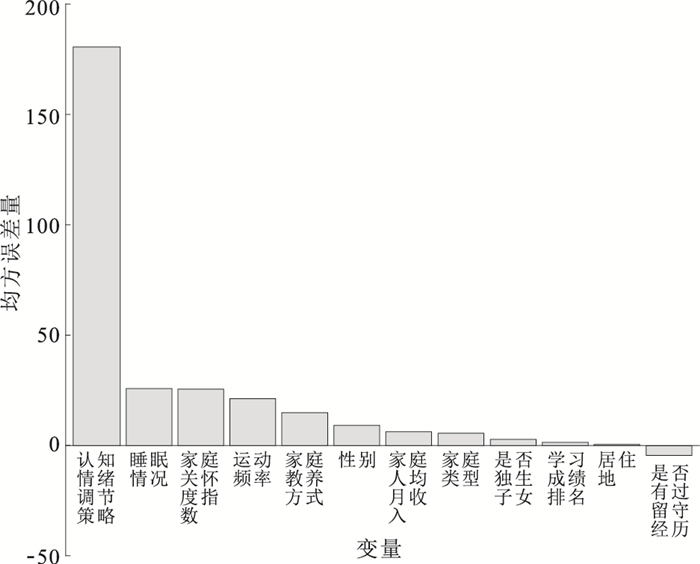Random forest model analysis of cognitive emotion regulation strategies and fear of negative evaluation among college students
-
摘要:
目的 探讨大学生负面评价恐惧的影响因素,为提高大学生心理健康水平提供实证依据。 方法 2024年3月采用方便抽样方法,从湖北省武汉市某3所大学抽取5 750名大学生,利用简明负面评价恐惧量表、中文版认知情绪调节策略量表、家庭关怀度指数量表和自编一般情况调查表进行线上问卷调查。利用最小二乘法回归模型分析负面评价恐惧的影响因素,同时构建随机森林模型探索负面评价恐惧的影响因素及各变量的重要性排序。 结果 最小二乘法回归模型结果显示,认知情绪调节策略对大学生负面评价恐惧水平的影响有统计学意义,其中相比适应性情绪调节策略组,非适应性情绪调节策略显著影响大学生负面评价恐惧水平(β=4.25,95%CI=3.81~4.68);家庭关怀中轻度障碍(β=-2.71,95%CI=-3.36~-2.06)、重度障碍(β=-1.64,95%CI=-2.27~-1.01)可能增加大学生负面评价恐惧水平(P值均<0.05)。随机森林模型中,根据%IncMSE排序和节点纯度排序,认知情绪调节策略均为影响大学生负面评价恐惧水平的最主要因素。 结论 认知情绪调节策略是影响大学生负面评价恐惧水平的关键因素。高校可采取针对性干预措施,缓解大学生的负面评价恐惧。 Abstract:Objective To explore the impact of cognitive emotion regulation strategies on fear of negative evaluation among college students using a random forest algorithm in order to provide empirical evidence to support mental health improvements. Methods In March 2024, a convenience sampling method was used to conduct an online survey with 5 750 college students from three universities in Wuhan, Hubei Province. A least squares regression model was employed to analyze whether cognitive emotion regulation strategies significantly influenced fear of negative evaluation. A random forest model was also constructed to identify predictors and rank the importance of various factors affecting fear of negative evaluation. Results The least squares regression model indicated that cognitive emotion regulation strategies significantly impacted fear of negative evaluation among college students (β=4.25, 95%CI=3.81-4.68, P < 0.05). Family support, including mild impairment (β=-2.71, 95%CI=-3.36 to -2.06, P < 0.05) and severe impairment in the domain (β=-1.64, 95%CI=-2.27 to -1.01, P < 0.05), were associated with increased fear. The random forest model further revealed that cognitive emotion regulation strategies, family support index, and academic ranking were the main factors affecting the fear of negative evaluation among college students. Conclusions Cognitive emotion regulation strategies are key factors influencing fear of negative evaluation among college students. Universities should provide enhanced mental health resources, offer training to strengthen cognitive emotion regulation strategies, and offer additional support to students with low family support. -
Key words:
- Fear /
- Mental health /
- Models /
- Structural /
- Students
1) 利益冲突声明 所有作者声明无利益冲突。 -
表 1 不同组别大学生负面评价高低分组分布比较
Table 1. Comparison of high and low scores of negative evaluation among college students in different groups
组别 选项 人数 高分组 低分组 χ2值 组别 选项 人数 高分组 低分组 χ2值 性别 男 1 610 982(60.99) 628(39.01) 14.44** 家庭类型 核心家庭 2 009 1 120(56.00) 880(44.00) 9.26 女 3 917 2 171(55.43) 1 746(44.57) 大家庭 320 196(61.25) 124(38.75) 学历 专科 1 065 526(49.39) 539(50.61) 38.31** 单亲家庭 50 30(60.00) 20(40.00) 本科 3 786 2 252(59.48) 1 534(40.52) 联合家庭 91 52(57.14) 39(42.86) 研究生及以上 676 375(55.47) 301(44.53) 重组家庭 100 69(69.00) 31(31.00) 居住地 城镇 2 900 2 268(78.21) 632(21.79) 1.42 隔代家庭 2 966 1 686(56.84) 1 280(43.16) 农村 2 627 885(33.69) 1 742(66.31) 家庭教养方式 严格 1 331 749(56.27) 582(43.73) 72.95** 独生子女 是 717 421(58.72) 296(41.28) 0.94 溺爱 92 63(68.48) 29(31.52) 否 4 810 2 732(56.80) 2 078(43.20) 漠不关心 218 150(68.81) 68(31.19) 学习成绩排名 排名前十 793 408(51.45) 385(48.55) 41.68** 粗暴 22 16(72.73) 6(27.27) 中等偏上 1 264 682(53.96) 582(46.04) 变化无常 386 284(73.58) 102(26.42) 中等 2 643 1 522(57.59) 1 121(42.41) 温暖 3 478 1 891(54.37) 1 587(45.63) 中等偏下 619 415(67.04) 204(32.96) 家庭人均月 >6 000 696 382(54.89) 314(45.11) 2.74 倒数后十 208 126(60.58) 82(39.42) 收入/元 4 000~6 000 1 160 672(57.93) 488(42.07) 运动频率 频繁 1 974 1 001(50.71) 973(49.29) 82.51** 2 000~<4 000 1 917 1 081(56.39) 836(43.61) 经常 2 454 1 409(57.42) 1 045(42.58) <2 000 1 754 1 018(58.04) 736(41.96) 几乎不 1 099 743(67.61) 356(32.39) 认知情绪调节 适应性 3 445 1 216(35.30) 2 229(64.70) 753.80** 睡眠情况 良好 3 170 1 584(49.97) 1 586(50.03) 160.40** 策略 非适应性 2 082 1 937(93.04) 145(6.96) 一般 2 284 1 365(59.76) 919(40.24) 家庭关怀度 重度障碍 584 345(59.08) 239(40.92) 263.20** 差 273 204(74.73) 69(25.27) 指数 轻度障碍 2 397 1 643(68.54) 754(31.46) 是否有留守 是 2 148 1 318(61.36) 830(38.64) 26.66** 功能良好 2 546 1 165(45.76) 1 381(54.24) 经历 否 3 379 1 835(54.31) 1 544(45.69) 注: ()内数字为构成比/%,**P < 0.01。 -
[1] MORRISON A S, GOLDIN P R, GROSS J J. Fear of negative and positive evaluation as mediators and moderators of treatment outcome in social anxiety disorder[J]. J Anxiety Disord, 2024, 104: 102874. doi: 10.1016/j.janxdis.2024.102874 [2] 叶贝, 李丹, 代同同, 等. 青少年早期负面评价恐惧的发展轨迹及其影响因素[J]. 心理科学, 2019, 42(1): 62-67.YE B, LI D, DAI T T, et al. Developmental trajectories and influencing factors of fear of negative evaluation in early adolescence[J]. J Psychol Sci, 2019, 42(1): 62-67. (in Chinese) [3] THUNNISSEN M R, DE JONG P J, RIJKEBOER M M, et al. Interventions targeting negative mental imagery in social anxiety: a systematic review and Meta-analysis of characteristics and outcomes[J]. Clin Psychol Psychoth, 2024, 31(3): e2996. doi: 10.1002/cpp.2996 [4] CAVICCHIOLI M, SCALABRINI A, NORTHOFF G, et al. Dissociation and emotion regulation strategies: a Meta-analytic review[J]. J Psychiatr Res, 2021, 143: 370-387. doi: 10.1016/j.jpsychires.2021.09.011 [5] ZHU P, LIU X, SHANG X, et al. Mindfulness-based stress reduction for quality of life, psychological distress, and cognitive emotion regulation strategies in patients with breast cancer under early chemotherapy: a randomized controlled trial[J]. Holist Nurs Pract, 2023, 37(3): 131-142. doi: 10.1097/HNP.0000000000000580 [6] JAZAIERI H, MORRISON A S, GOLDIN P R, et al. The role of emotion and emotion regulation in social anxiety disorder[J]. Curr Psychiatry Rep, 2015, 17(1): 531. doi: 10.1007/s11920-014-0531-3 [7] 徐扬, 刘海燕, 刘慧敏. 大学生社交焦虑和手机成瘾的关系: 科技侵扰和负面评价恐惧的并行中介作用[J]. 中国健康心理学杂志, 2024, 32(6): 926-933.XU Y, LIU H Y, LIU H M. Parallel mediating role of technology intrusion and fear of negative evaluation in the relationship between social anxiety and smartphone addiction of college students[J]. Chin J Health Psychol, 2024, 32(6): 926-933. (in Chinese) [8] 邹艳辉, 王晖. 我国家庭发展及特殊家庭类型研究[J]. 人口与健康, 2019(3): 37-42.ZOU Y H, WANG H. Research on family development and special family types in China[J]. Popul Health, 2019(3): 37-42. (in Chinese) [9] PITARCH M J. Brief version of the Fear of Negative Evaluation Scale-Straightforward Items (BFNE-S): psychometric properties in a Spanish population[J]. Span J Psychol, 2010, 13(2): 981-989. doi: 10.1017/S1138741600002626 [10] 占萍萍, 古静静, 王金良. 父母教养方式类型与青少年网络成瘾的关系: 认知情绪调节策略的中介作用[J]. 心理与行为研究, 2023, 21(6): 776-783.ZHAN P P, GU J J, WANG J L. The relationship between types of parenting styles and adolescent Internet addiction: the mediating role of cognitive emotion regulation strategies[J]. Res Psychol Behav, 2023, 21(6): 776-783. (in Chinese) [11] 闫纪霞, 刘林霞, 史培培, 等. 大学生攻击性行为潜在类别与家庭关怀度和生命意义感的相关性[J]. 中国学校卫生, 2022, 43(12): 1817-1821. doi: 10.16835/j.cnki.1000-9817.2022.12.014YAN J X, LIU L X, SHI P P, et al. The correlation between potential categories of aggressive behavior among college students, family care, and sense of meaning in life[J]. Chin J Sch Health, 2022, 43(12): 1817-1821. (in Chinese) doi: 10.16835/j.cnki.1000-9817.2022.12.014 [12] HU L, LI L. Using tree-based machine learning for health studies: literature review and case series[J]. Int J Environ Res Public Health, 2022, 19(23): 16080. doi: 10.3390/ijerph192316080 [13] HEERMAN W J, SOMMER E C, QI A, et al. Evaluating dose delivered of a behavioral intervention for childhood obesity prevention: a secondary analysis[J]. BMC Public Health, 2020, 20(1): 885. doi: 10.1186/s12889-020-09020-w [14] 彭顺, 汪夏, 牛更枫, 等. 负面评价恐惧对社交焦虑的影响: 基于社交焦虑的认知行为模型[J]. 心理发展与教育, 2019, 35(1): 121-128.PENG S, WANG X, NIU G F, et al. Fear of negative evaluation on social anxiety: base on cognitive behavioral model of social anxiety disorder[J]. Psychol Dev Educ, 2019, 35(1): 121-128. (in Chinese) [15] 史敬怡, 韦欣雨, 王礼军. 负面评价恐惧与大学生容貌焦虑的关系: 功能失调性态度的中介作用[J]. 中国健康心理学杂志, 2023, 31(12): 1898-1903.SHI J Y, WEI X Y, WANG L J. Relationship between fear of negative evaluation and appearance anxiety among college students: the mediating role of dysfunctional attitude[J]. Chin J Health Psychol, 2023, 31(12): 1898-1903. (in Chinese) [16] GROSS J J, JOHN O P. Individual differences in two emotion regulation processes: implications for affect, relationships, and well-being[J]. J Pers Soc Psychol, 2003, 85(2): 348-362. doi: 10.1037/0022-3514.85.2.348 [17] GELKOPF M, BERGER R, BLEICH A, et al. Protective factors and predictors of vulnerability to chronic stress: a comparative study of 4 communities after 7 years of continous rocket fire[J]. Soc Sci Med, 2012, 74(5): 757-766. doi: 10.1016/j.socscimed.2011.10.022 [18] 袁坤, 罗艳艳, 叶林, 等. 非适应性认知情绪调节策略对研究生心理脆弱的影响: 心理资本的中介作用[J]. 中国健康心理学杂志, 2022, 30(4): 596-601.YUAN K, LUO Y Y, YE L, et al. Influence of non-adaptive cognitive emotion regulation on mental vulnerability of master postgraduates: mediating role of psychological capital[J]. Chin J Health Psychol, 2022, 30(4): 596-601. (in Chinese) [19] 何桂华, 黄财英. 大学生自我接纳与家庭关怀度的相关研究[J]. 中国健康心理学杂志, 2009, 17(5): 582-584.HE G H, HUANG C Y. The relationship between college students' self-acceptance and their familial caring degrees[J]. Chin J Health Psychol, 2009, 17(5): 582-584. (in Chinese) [20] 艾春燕, 王玲莉, 杨钰立, 等. 少数民族大学生性格优势在家庭关怀与生活满意度间的中介作用[J]. 中国健康心理学杂志, 2020, 28(5): 788-792.AI C Y, WANG L L, YANG Y L, et al. The mediating role of character strengths in the relationship between family care and life satisfaction among ethnic minority college students[J]. Chin J Health Psychol, 2020, 28(5): 788-792. (in Chinese) [21] FARMAKOPOULOU I, LEKKA M, GKINTONI E. Clinical symptomatology of anxiety and family function in adolescents: the self-esteem mediator[J]. Children (Basel), 2024, 11(3): 338. -







 下载:
下载:


